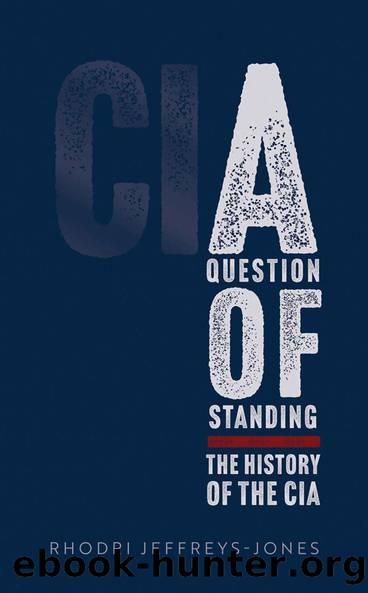A Question of Standing by Rhodri Jeffreys-Jones

Author:Rhodri Jeffreys-Jones [Jeffreys-Jones, Rhodri]
Language: eng
Format: epub
ISBN: 9780192663924
Publisher: OUP Oxford
Published: 2022-07-28T00:00:00+00:00
13
The Great Diminishing Reform Act of 2004
The Intelligence Reform and Terrorism Prevention Act of 2004 does not stand out as one of the great events of the administration of President George W. Bush (2001â9). For the CIA, however, it was the biggest structural and mission change since 1947.
Any discussion of the causes of the reform leads straight into the realm of controversy. All agree that it was a response to the 9/11 attack. But critics charged that it was politically driven. They argued that the Bush administration had failed to protect American citizens on that fateful day in the fall of 2001 and sought a scapegoat for its own failure. That search led to the targeting of the CIA, which was charged with dereliction of its duty of preventive intelligence and punished with demotion for offenses it did not commit.
CIA partisans and their allies insisted on the unfairness of the charges against the agency. Some pointed to the White Houseâs poor handling of intelligence. At the time of the 9/11 attack, Condoleezza Rice was President Bushâs national security adviser. When a professor at Stanford University in the 1980s, this only child of a college dean had lectured students on the reason for the Pearl Harbor intelligence failure. But had she learned her own lessons? As she aptly recalled, âItâs one thing to read about it and quite another to be in control, maybe the central character in the drama.â1
On Riceâs watch there had been a lack of receptivity to clues. A month after she failed to attend a 5 July 2001 meeting of counterterror officials that she herself had convened, CIA Director George Tenet issued his warning of an acute danger of an attack by al-Qaeda. Rice later remarked that this 6 August report cobbled together old and inconclusive information. She contended that the very fact that the president had had to ask for a report on the terrorist threat showed that the CIA was not doing its job. Not everyone believed this sophisticated defense.2
While some defenders of the CIA pointed diversionary fingers at Rice, others argued that the administration had failed to take a wider view of what caused the terrorist problem. Michael Scheuer, it will be recalled, had a challenging interpretation of events: âWashingtonâs maintenance of a policy of status quo toward the Moslem world and its more or less constant green light for Israelâs actions against the Palestinians would have resulted in more young men volunteering for jihad even if bin Laden did not exist.â3
In our review of the causes of the 2004 legislation, we shall consider further issues that are not so much political controversies as historical discussion points. One of these concerns the timing of the decision to demote the CIA in Americaâs intelligence hierarchy. The drastic reform came at a time of national peril, a departure from precedent. The other issue, more speculative in nature, is the part played by the fatherâson relationship between the first Bush president, George H. W., and his heir in the White House, his son George W.
Download
This site does not store any files on its server. We only index and link to content provided by other sites. Please contact the content providers to delete copyright contents if any and email us, we'll remove relevant links or contents immediately.
The Secret History by Donna Tartt(16706)
The Social Justice Warrior Handbook by Lisa De Pasquale(11503)
Thirteen Reasons Why by Jay Asher(7824)
This Is How You Lose Her by Junot Diaz(5819)
Weapons of Math Destruction by Cathy O'Neil(5068)
Zero to One by Peter Thiel(4859)
The Myth of the Strong Leader by Archie Brown(4806)
Promise Me, Dad by Joe Biden(4471)
Beartown by Fredrik Backman(4457)
How Democracies Die by Steven Levitsky & Daniel Ziblatt(4439)
Stone's Rules by Roger Stone(4434)
The Fire Next Time by James Baldwin(4364)
100 Deadly Skills by Clint Emerson(4103)
A Higher Loyalty: Truth, Lies, and Leadership by James Comey(4051)
Rise and Kill First by Ronen Bergman(4037)
The David Icke Guide to the Global Conspiracy (and how to end it) by David Icke(3908)
The Farm by Tom Rob Smith(3890)
Secrecy World by Jake Bernstein(3800)
The Doomsday Machine by Daniel Ellsberg(3748)
